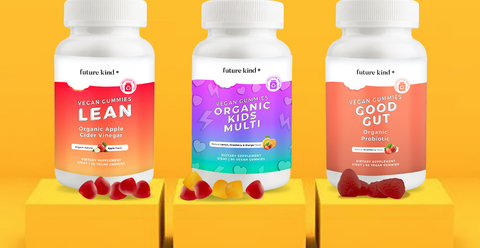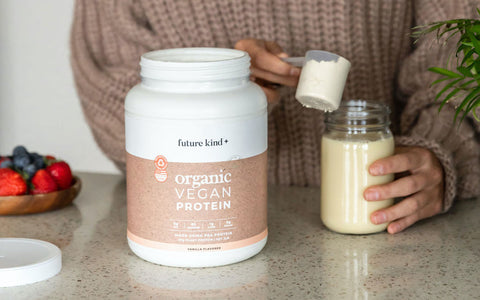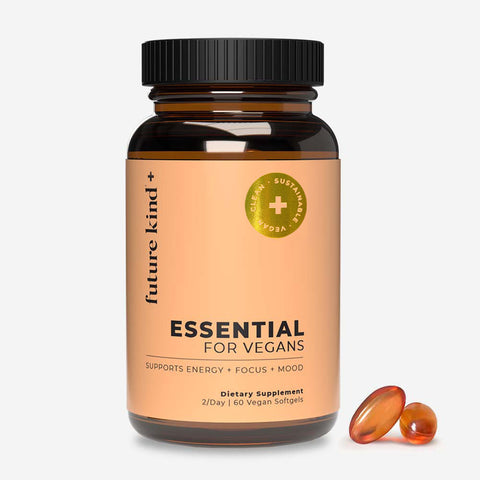Thanks to cleverly calculated marketing campaigns for fatty fish, you're likely already aware of the important role that omega-3 fatty acids play in your everyday health.
Omega-3s are crucial for optimal heart health, hormone synthesis, and genetic function, and while there are many different types of foods that can provide our body with enough omega-3 fatty acids to carry out all of these functions, 95% of Americans are still not getting enough omegas on a daily basis.
Concerned you may be part of the percentage too?
Here we explain what insufficient omega-3 levels look like for most people, and set out a game plan to avoid any of these symptoms by getting your omegas back on track!
Signs of omega 3 deficiency
When it comes to omega-3 deficiency, symptoms are generally easy to spot, although they may often be mistaken for symptoms of other deficiencies like iron and B12 deficiency.
The best way to identify an omega-3 deficiency is to run a blood test aimed specifically to measure the levels of EPA and DHA present in your blood, known as the Omega-3 Index Test.
But before you go ahead and book your blood work, here are some of the most common deficiency symptoms you might want to watch out for if you are worried about your omega-3 levels!
Omega 3 deficiency hair loss

One of the most important functions that omega-3s cover in our body is to build up cell walls, and when levels drop too low to perform this function optimally, many people tend to experience dry, lifeless, brittle hair prone to breakage and split ends, and in some cases, even dandruff.
Omega 3 deficiency skin
For the same exact reason, omega-3 deficiency can also cause flaky, dry skin and red, itchy rashes.
You may also experience other skin problems like rough patches of skin and small bumps on the back of your upper arms and, less commonly, legs. If an allergic reaction doesn't seem to be the cause of these sudden symptoms, omega-3 deficiency might be the culprit.
Children and young adults appear to be more likely to develop skin issues as a symptom of omega deficiency, while adults and older individuals tend to develop symptoms related to their cognitive function.
Omega 3 deficiency acne
Omega-3s are responsible for fighting inflammation, believed to be one of the driving causes of hormonal and skin issues like acne. On the other hand, diets rich in omega-3 fatty acids or omega-3 supplements have been associated with decreased acne lesions as a welcomed side effect of decreased inflammation.
If you can deal with dry skin but cannot endure increasingly severe acne, hormonal treatments might not be the best way out — get your EPA and DHA levels checked instead!
Omega 3 deficiency nails
A lack of omega-3s in your diet can affect your nails the same way it does your hair.
It's not uncommon for people to develop paper-thin, brittle nails that are prone to peeling and cracking, a painful reminder that all the cells in your body are lacking the nutrients needed to keep them strong.
Omega 3 deficiency concentration and brain functioning
Omega-3s are also responsible for optimal brain function, as they make up approximately 60% of our brains, playing the starring role in supporting the constant messages that our body sends to our brains, and vice versa. Omega-3s are also an essential component of the neurotransmitter serotonin, responsible for regulating our mood and mental health.
Other Omega 3 Deficiency Symptoms
Lack of omega-3 in diets has been associated with impaired concentration, memory problems, and even mood disorders like depression, making cognitive issues like these some of the most severe symptoms of omega deficiency. Other symptoms include joint pain, leg cramps, chronic fatigue, trouble getting to sleep and staying asleep, heavier menstrual cycles, allergy symptoms like hives and asthma, and even unexpected excessive ear wax!
Omegas are also crucial to maintain heart health, so if you've been experiencing cardiovascular issues, lack of omegas might be a probable cause.
What are Omega 3s?
It's now abundantly clear that omega-3 fatty acids are responsible for a great deal of crucial functions. Optimal omega-3 levels are associated with a decreased risk of developing heart disease, as well as being great protectors against eczema, arthritis, lupus, and even some types of cancer.
They are essential polyunsaturated fats, meaning they cannot be made by our bodies but they have to be sourced from the food we consume instead. There are three main types of omegas: eicosapentaenoic acid (EPA), docosahexaenoic acid (DHA), and alpha-linolenic acid (ALA), which is the most common omega-3 fatty acid in diets.
How Do I Get Enough Omega 3s?

So, why is it that so many of us still struggle to get enough omega-3 to support all these functions?
Dietary sources of omega-3 are not that rare, but out of the three main types of these fatty acids our body needs, only ALA is the fatty acid that we generally manage to get from our diets. The other two types, DHA and EPA, are equally as important for our health, but only a very small amount of ALA can be converted into EPA and DHA, meaning that we'll have to pay special attention to what we're eating in order to get enough.
How much is enough? The RDA for ALA fatty acid sits around 1g and 1.6g for adults, while there is no official recommended daily intake for DHA and EPA. Most health organizations, however, recommend a daily intake of approximately 200-250mg of combined DHA and EPA for adults.
Best Omega 3 Sources (ALA/DHA/EPA) & Mercury Warning
ALA fatty acids can be found in plant-based foods like soybeans, nuts and seeds, with flaxseed in particular being largely considered the richest source of ALA available.
It may be easy to say that the best sources of DHA and EPA come from the sea, but it's not as simple as you might think. While fatty fish like salmon, mackerel, and seabass, along with oysters and shrimp, were previously considered the best sources of these essential fats, they are also unfortunately increasingly contaminated with high levels of mercury and microplastics. That's the polar opposite of what health food should be!
The good news is that the fish get their omega-3 from algae, which is the best pollutant-free source of EPA and DHA. The only problem is that algae-based sources are going to be hard to find at your local supermarket, but that's where handy supplements come into play (don't worry, we'll expand more on that in a second).
Vegan Omega 3 Sources

Those following a plant-based diet will have no trouble getting enough ALA as long as they make sure to incorporate flaxseed, chia seeds, hemp seeds, and walnuts into their daily diet, though they might have a much harder time getting enough DHA and EPA omega-3 from dietary sources alone.
Seaweed and algae are in fact the only vegan sources of EPA and DHA, which are foods not commonly found in Western diets (except for the odd nori sheet wrapping sushi together, perhaps!). The fishy taste of seaweed like wakame and kombu might be enough to put many vegans off, and the exact levels of omega-3 found in algae tend to vary. It doesn't come as a surprise that many vegans opt for taking supplements for EPA and DHA instead.
Omega 3 Supplements
Fish oil has become one of the most popular supplements for omega-3s in the health and fitness market, but it might not be the best choice if you're looking to get your omega-3 levels back on track.
Natural fish oil only contains about 30% of actual DHA and EPA, opting for filling up the rest with unwanted fats that won't protect you against heart disease the same way concentrated DHA and EPA will. On top of that, the more popular refined fish oil has been found to not be absorbed by the body as efficiently as real fatty fish.
Loading up on the salmon won't do much good either: as mentioned above, mercury levels in farmed fish keep increasing despite worldwide concerns, and pregnant women especially would do well staying clear of this risky source of omegas.
So, what's the solution? What is the best omega-3 supplement you can get your hands on to improve your heart health, concentration, skin, hair, and nails?
Vegan omega 3 supplements
Algae-based supplements are the best answer to your omega-3 concerns.
Not only are they vegan-friendly and free of mercury and other pollutants, but they're also the most efficient way of getting your daily dose of omegas, risk-free.
Our Vegan Omega-3 is the perfect example of what a great omega supplement can do: packing in 150mg DHA and 75mg EPA in easy-to-swallow, peppermint-scented softgel tablets, this supplement is made from sustainably-sourced algae and designed to help your body fight inflammation, support joint health, and maintain optimal cognitive function.
All the goodness of the sea, with none of the "fishy" bits — avoiding omega-3 deficiencies is really quite simple when you put it in this way!









Comments (0)
There are no comments for this article. Be the first one to leave a message!